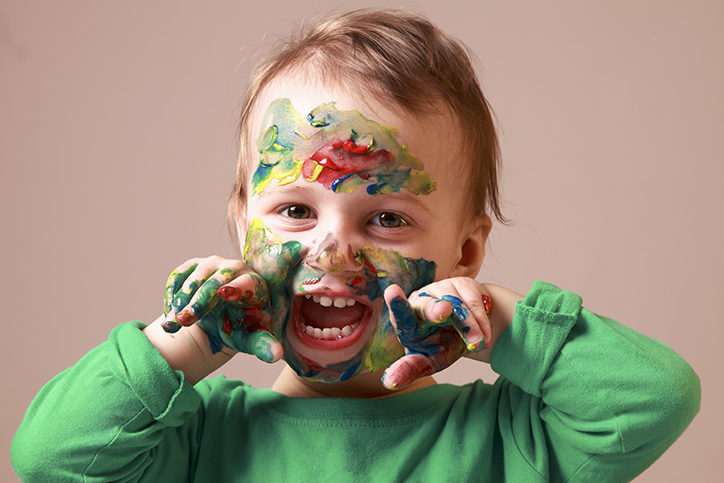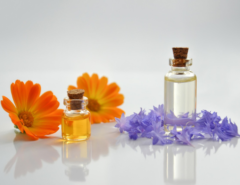Children learn about their environment by exploring. They look, touch, and taste. Sometimes, the things they taste are a real head scratcher, but are they actually harmful? Let’s take a look at some common items often mentioned in the calls we receive.
Art Supplies
Art supplies such as markers, crayons, and chalk are meant for paper, yet they seem to end up on everything but paper. Taking a bite out of chalk or crayons usually won’t cause any problems, but, depending on the size of the piece consumed, they can be a choking hazard. Eaten in larger amounts, a child may have a mild case of diarrhea. Children who lick or suck on a marker for longer than a taste may also have an upset stomach afterwards. Playdoh is another common item we hear about. A taste or bite won’t cause harm, and don’t be worried when you see it in their poop afterwards. Eating more than a bite may cause an upset stomach or diarrhea.
Cigarettes and Nicotine
Cigarettes and cigarette butts are often left in purses and jacket pockets, or on tables within a child’s reach. As a result, they end up in a lot of children’s mouths. Electronic nicotine delivery systems (ENDS) are also dangerous to leave in a child’s reach, because a child may put the mouthpiece in their mouth. ENDS use an e-liquid that contains nicotine and can get in the child’s mouth. Cigarette butts should be thrown away as soon as you’re finished with them. Leaving them in easy-to-reach ash trays or in the yard means children can easily get them and put them in their mouth. If you see a child with a cigarette, cigarette butt, or an ENDS in their mouth, call the poison center right away. People who use chewing tobacco need a place to spit the juices that build up in their mouth. They may use a drinking cup, soda bottle, or water bottle. Curious and thirsty youngsters sometimes take a drink from these containers. This can be very harmful because those juices contain nicotine. If a child swallows anything containing nicotine, it can cause vomiting, seizures, and affect their heart. More information can be found on our one-page E-Cigarette and Nicotine Information Sheet.
Cosmetics and Personal Care Products
Cosmetics such as lipstick, foundation, and powder are often left on the bathroom counter or easily accessible in a purse or bag. Little eyes with curious minds may watch adults applying makeup and want to do it themselves. Some children get the hang of where to apply these products, but for others, it may end up in their mouths. A taste or lick of cosmetics won’t cause a problem. Larger amounts of lipstick or creams can cause diarrhea. We also hear about personal care products such as deodorant, perfume, and lotions. A lick or taste won’t cause problems, but if more is swallowed, the child may have an upset stomach and diarrhea. Hand sanitizer can be found almost anywhere you go. Swallowing a pea sized amount is not harmful, even for a small child. In larger amounts, such as multiple pumps, the products can cause problems. But, most children are unable to swallow a large amount because the products are irritating to the mouth and throat. Read more on our one-page Hand Sanitizer Information Sheet.
Pet Food and Cat Litter
Children will often share their food with the family pet, so why shouldn’t the family pet share their food with the child? Children will occasionally try dog, cat, fish, or bird food and treats. There is no harm in a child getting just a taste of pet food. But, if the pet is taking medicine and the medicine is mixed in with the food, take extra care to keep children away from the food dish until the pet finishes it. Cat litter also will not cause a problem in small amounts, but it can become a choking hazard or cause a blockage in the intestines if larger quantities are eaten.
Plants
There are many different types of plants, and it isn’t always easy to tell whether a plant is poisonous or harmless. This is true for both indoor and outdoor plants. A poisonous plants list is available to download on our website. If a plant is on this list, it doesn’t mean it’s deadly — it might cause minor mouth irritation or a rash on the skin. If a plant is not on the list at all, it can’t be assumed to be poisonous or non-poisonous, as this list is not all-inclusive. If you’re unsure about whether a plant is toxic, you can always call our experts and ask. If a child eats any plant, remove the remaining plant material from their mouth. Rinse the mouth with water and call the Maryland Poison Center immediately for more instructions. DO NOT wait for symptoms to call and DO NOT make the child vomit.
Poop
What motivates a child to eat poop? That is one of the great mysteries of parenthood. Horrified parents will call us after finding the child they put down for a nap sitting in their crib eating poop out of their diaper. Others will call about dog, cat, or wild animal poop that their child has sampled. Eating a small amount, such as a mouthful, of poop is not harmful. If the child starts to have symptoms such as nausea, vomiting, diarrhea, or a fever, call the poison center.
The pharmacists and nurses at the Maryland Poison Center are available 24 hours a day, 7 days a week by calling 1-800-222-1222. If you think your child has consumed an item they shouldn’t have, our specialists are happy to help, even if it’s just to give you peace of mind. Never be embarrassed to call. Chances are that the specialist you’ll speak with has helped another parent in the same situation as you!





Leave a Reply